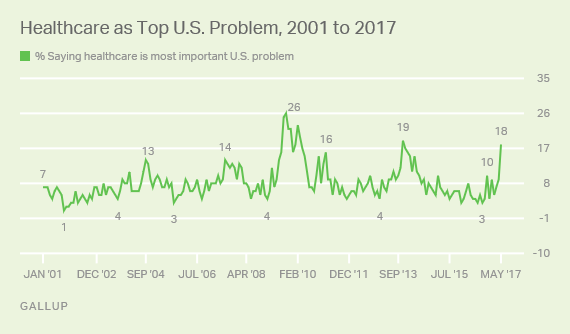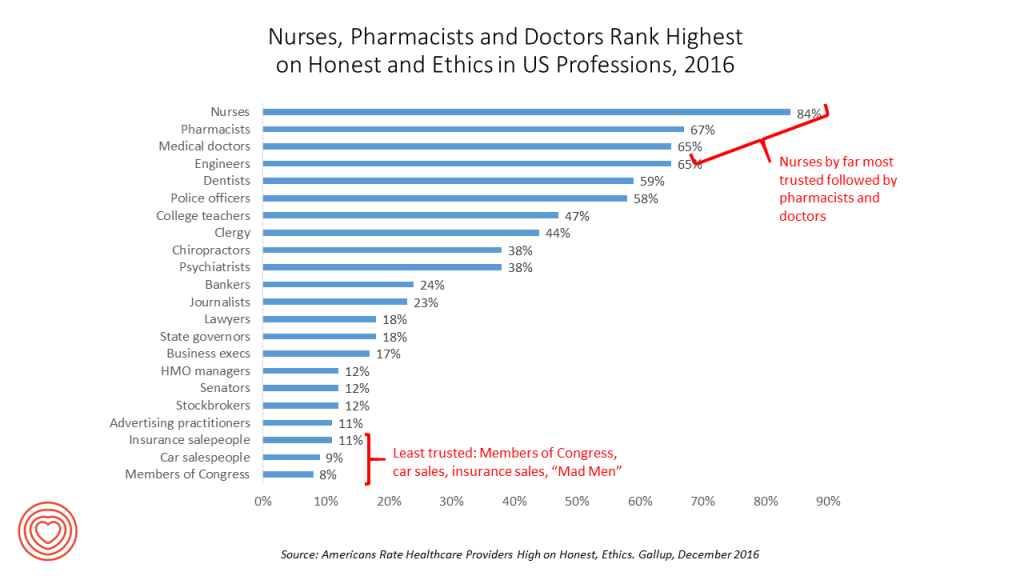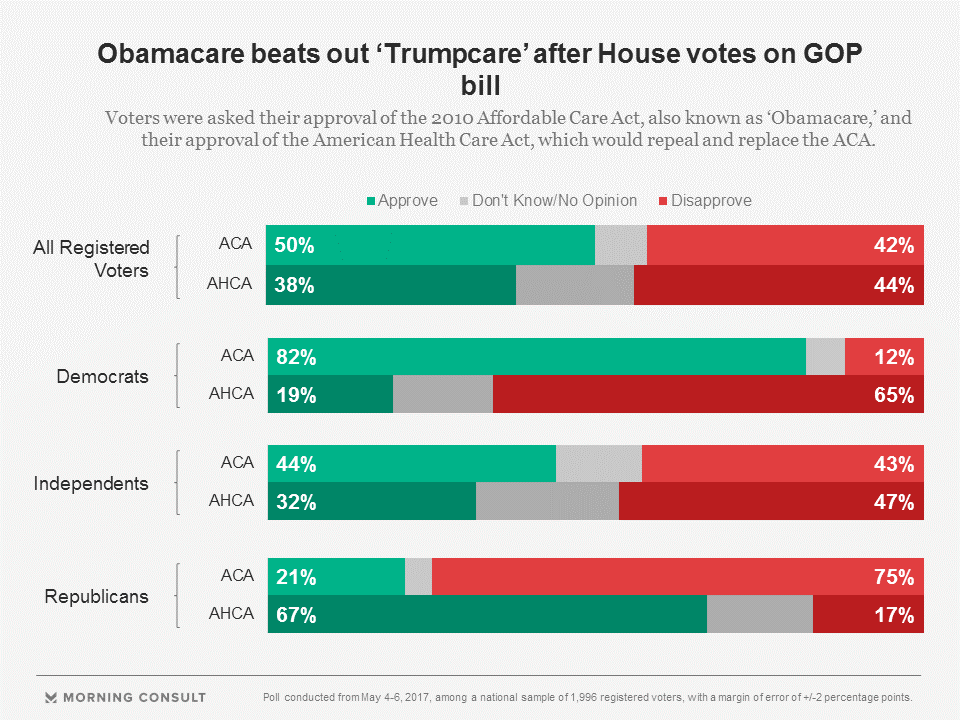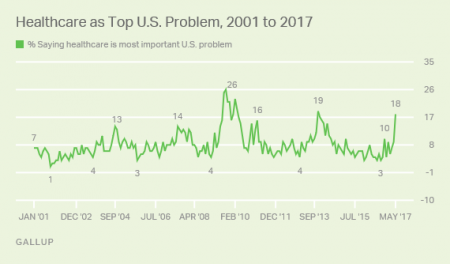
Healthcare tops the list of Americans’ concerns, tied with a dissatisfaction for government, this month (May 2017). According to a Gallup poll published 12 May, poor government leadership and healthcare are together the most important problem currently facing the U.S.
Immigration, the economy, jobs, and race relations are distance 3rd places in this survey, which was conducted during the first week of May 2017 among 1,011 U.S. adults 18 years and older.
The highest percent of Americans citing healthcare as America’s most important problem was 26%, found in August/September 2008 when town hall meetings round the country were protesting healthcare reform efforts, Gallup noted.
In this May poll, consumers are reacting to the House of Representatives’ failed efforts to “repeal and replace” Obamacare as promised by President Trump during his campaign.
The party breakdown of the 18% of healthcare dissatisfaction is:
Democrats = 24% ranking healthcare as #1 national problem
Independents = 17%
Republicans = 14%.
“With the repeal of Obamacare a distinct possibility,” Gallup writes, “Americans believe healthcare is one of the most important problems in the U.S. As the Senate debate over a new healthcare law wears on, this issue is likely to loom as a top-of-mind concern for months, if not years, to come.”
 Health Populi’s Hot Points: One of the data points I’ve been using in speech-making and project presentations over the past year is this second one: it details Americans’ views on honesty and ethics in professions in the nation based on Gallup’s annual poll published in December 2016. For many years, nurses and pharmacists take first and second place, followed by physicians. Note the lowest-ranked jobs in America based on ethics and honesty, the ranking of which has been quite consistent over the past few years: U.S. consumers point to people working in sales for advertising, automotive, and insurance, with members of Congress on the bottom.
Health Populi’s Hot Points: One of the data points I’ve been using in speech-making and project presentations over the past year is this second one: it details Americans’ views on honesty and ethics in professions in the nation based on Gallup’s annual poll published in December 2016. For many years, nurses and pharmacists take first and second place, followed by physicians. Note the lowest-ranked jobs in America based on ethics and honesty, the ranking of which has been quite consistent over the past few years: U.S. consumers point to people working in sales for advertising, automotive, and insurance, with members of Congress on the bottom.
That kind of dissatisfaction has led to an ongoing erosion of trust between American citizens (who also wear the hats of health citizens) and government, captured by the Edelman Trust Barometer in its annual 2017 survey published in January.
 Note the high trust equity U.S. consumers — health citizens — have in their healthcare providers, compared with the low trust in Members of Congress. Note that healthcare providers – nurses, doctors, pharmacists, hospitals, and other industry stakeholders — have strongly rejected the American Health Care Act as drafted by Congressional Republicans. Take doctors: 66% of physicians have a negative impression of the AHCA, found in a Merritt Hawkins survey published this week.
Note the high trust equity U.S. consumers — health citizens — have in their healthcare providers, compared with the low trust in Members of Congress. Note that healthcare providers – nurses, doctors, pharmacists, hospitals, and other industry stakeholders — have strongly rejected the American Health Care Act as drafted by Congressional Republicans. Take doctors: 66% of physicians have a negative impression of the AHCA, found in a Merritt Hawkins survey published this week.
The third graphic presents the latest survey results showing Obamacare more popular than Trumpcare as passed.
The Gallup poll on healthcare being the #1 issue calls out Americans’ focus on and value of healthcare for themselves and their families. As members of the Senate have begun working to draft their own flavor of healthcare reform, Senators would be wise to consider the views of U.S. health citizens and those of healthcare providers who are on the front lines of serving health citizens in doctors’ offices, pharmacies, hospital beds, and clinics.





 I am so grateful to Tom Lawry for asking me to pen the foreword for his book, Health Care Nation,
I am so grateful to Tom Lawry for asking me to pen the foreword for his book, Health Care Nation,  I love sharing perspectives on what's shaping the future of health care, and appreciate the opportunity to be collaborating once again with Duke Corporate Education and a global client on 6th May. We'll be addressing some key pillars to consider in scenario planning such as growing consumerism in health care, technology (from AI to telehealth), climate change, and trust -- the key enabler for health engagement or dis-engagement and mis-information. I'm grateful to be affiliated with the corporate education provider
I love sharing perspectives on what's shaping the future of health care, and appreciate the opportunity to be collaborating once again with Duke Corporate Education and a global client on 6th May. We'll be addressing some key pillars to consider in scenario planning such as growing consumerism in health care, technology (from AI to telehealth), climate change, and trust -- the key enabler for health engagement or dis-engagement and mis-information. I'm grateful to be affiliated with the corporate education provider  Thank you FeedSpot for
Thank you FeedSpot for